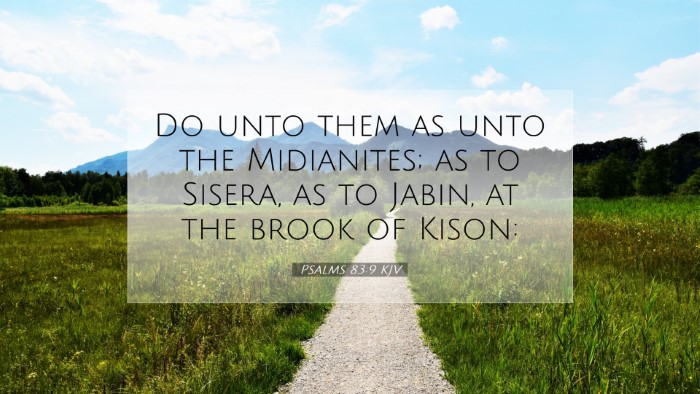Commentary on Psalms 83:9
Psalms 83:9: "Do unto them as unto the Midianites; as to Sisera, as to Jabin, at the brook of Kishon."
Introduction
This verse is situated within a psalm that presents a desperate plea for divine intervention against hostile nations that seek to undermine Israel. It is a petition for God to act decisively against those who conspire against His people, using historical references to God's past victories over their enemies as a basis for the prayer. In this commentary, we draw insights from the writings of Matthew Henry, Albert Barnes, and Adam Clarke to elucidate the meaning and implications of Psalm 83:9.
Contextual Analysis
The Psalms often reflect the struggles of the Israelite nation—both internally and with external foes. Psalm 83 is a communal lament that implores God to take action against a coalition of nations intent on the annihilation of Israel. The historical references to the Midianites and the leaders Sisera and Jabin serve as reminders of God’s omnipotent capability to deliver His people.
The Significance of the Historical References
- The Midianites: They represent a recurring threat throughout Israel’s history. In Judges 6-7, God uses Gideon to defeat them, showcasing reliance on divine strength over human might.
- Sisera and Jabin: Their defeat at the hands of Jael, as chronicled in Judges 4, exemplifies God’s sovereignty over Israel’s enemies. Sisera’s humiliating end serves as a warning to those who oppose God’s chosen people.
- The brook of Kishon: This geographical reference emphasizes the fulfillment of God’s justice in a definitive location, reinforcing the notion that God watches over His creation and acts in the world.
Theological Implications
The invocation to remember past judgments against enemies implies a theology of retribution that pervades the Hebrew Scriptures. It is not a call for blind vengeance but a request for God to act in accordance with His covenant faithfulness and righteousness.
Divine Justice
In Psalm 83:9, the psalmist brings forth a plea for God to execute justice similar to His past judgments. Matthew Henry expounds that the request aligns with the understanding that God is not only a protector of His people but also an avenger against their foes. This stance nurtures a proper perception of God’s attributes—a God who is both merciful and just.
Remembrance and Expectation
Both Albert Barnes and Adam Clarke emphasize the importance of remembering God’s past acts as a means of bolstering faith and expectation. Reflecting on previous deliverances enhances the fervency of prayer. Past mercies and judgments serve to remind believers of God’s active role in their history and instill confidence in His future intervention.
Practical Applications
The exhortation in Psalm 83:9 encourages believers to rely on God in times of crisis, reflecting on His past deliverances as a source of hope. It believes in the communal aspect of prayer, petitioning God not only for personal concerns but also for collective needs among God’s people.
- Prayer as a Weapon: Pastorally, this psalm encourages believers to engage in conscious, corporate prayer while declaring God's past faithfulness in their supplications.
- Unity in Adversity: The psalm exemplifies the need for unity among God’s people, particularly when facing opposition. The collective cry elevates the urgency of the plea.
- Trust in God’s Sovereignty: Understanding that God can intervene in history encourages believers to trust in His plans, allowing them to confront challenges without despair.
Conclusion
Psalms 83:9 serves as a poignant reminder of God’s faithfulness to His people and His capability to deliver them from their adversaries. The historical examples of the Midianites, Sisera, and Jabin provide a rich theological framework for understanding God’s justice and mercy. By drawing on these themes, the psalm encourages believers to engage deeply in prayer, rooted in the remembrance of God’s past actions while confidently anticipating His future interventions.
Ultimately, this psalm reverberates through the ages, assuring God’s people that He is attentive to their cries and ready to respond to injustice with divine authority, just as He has in the past.


